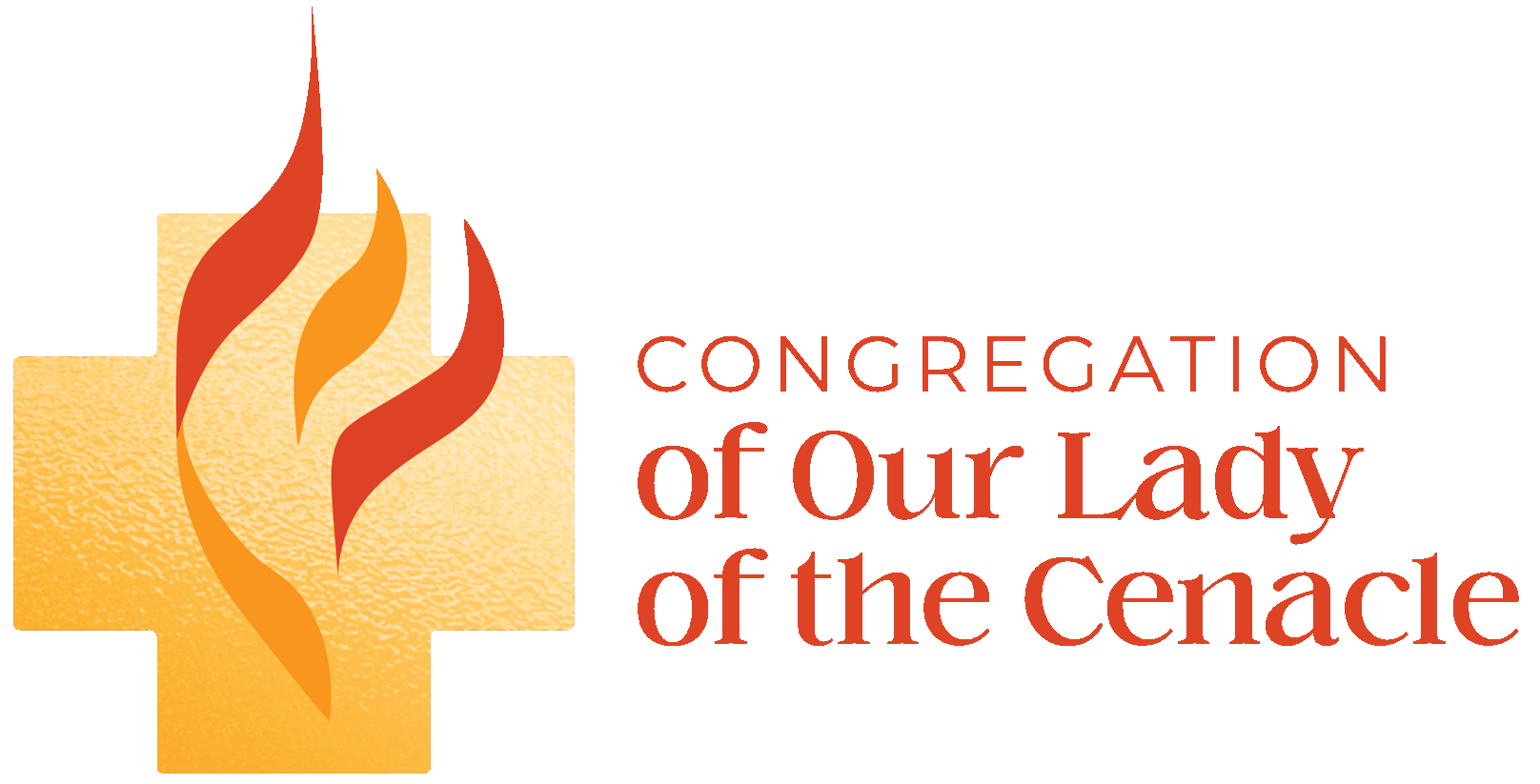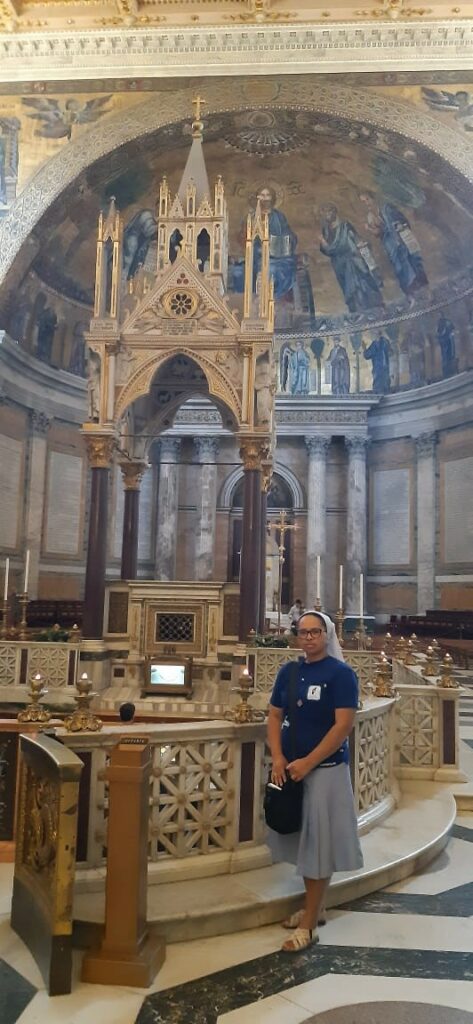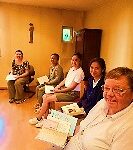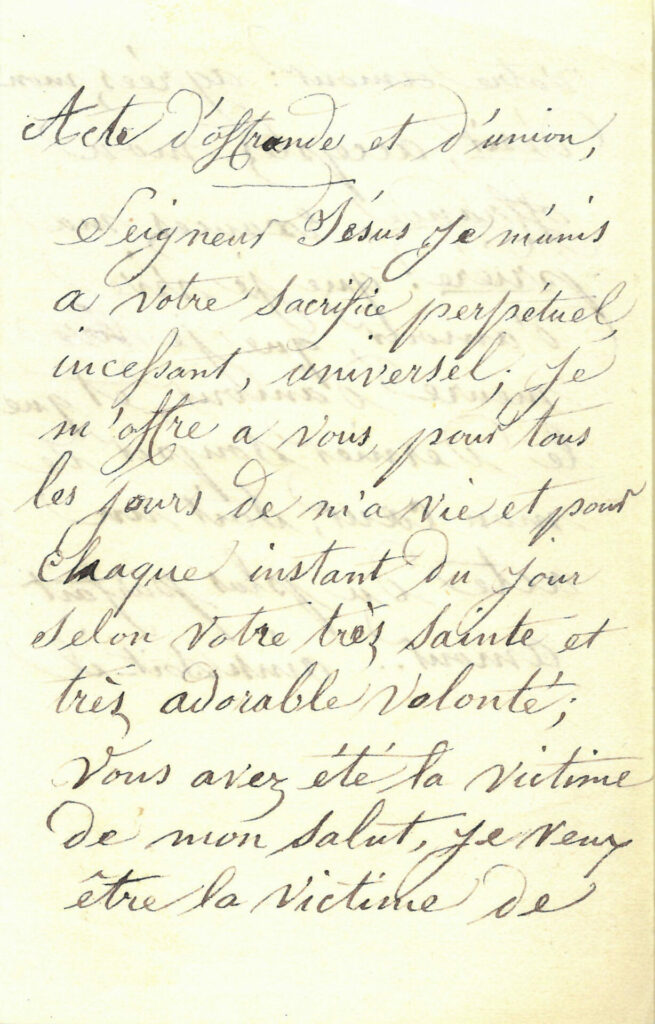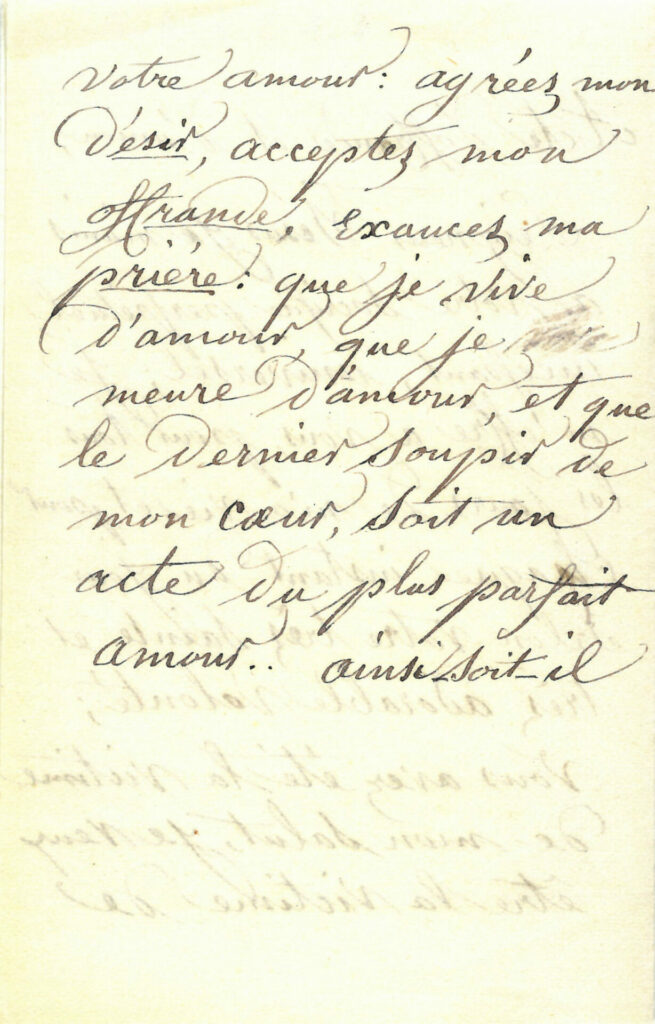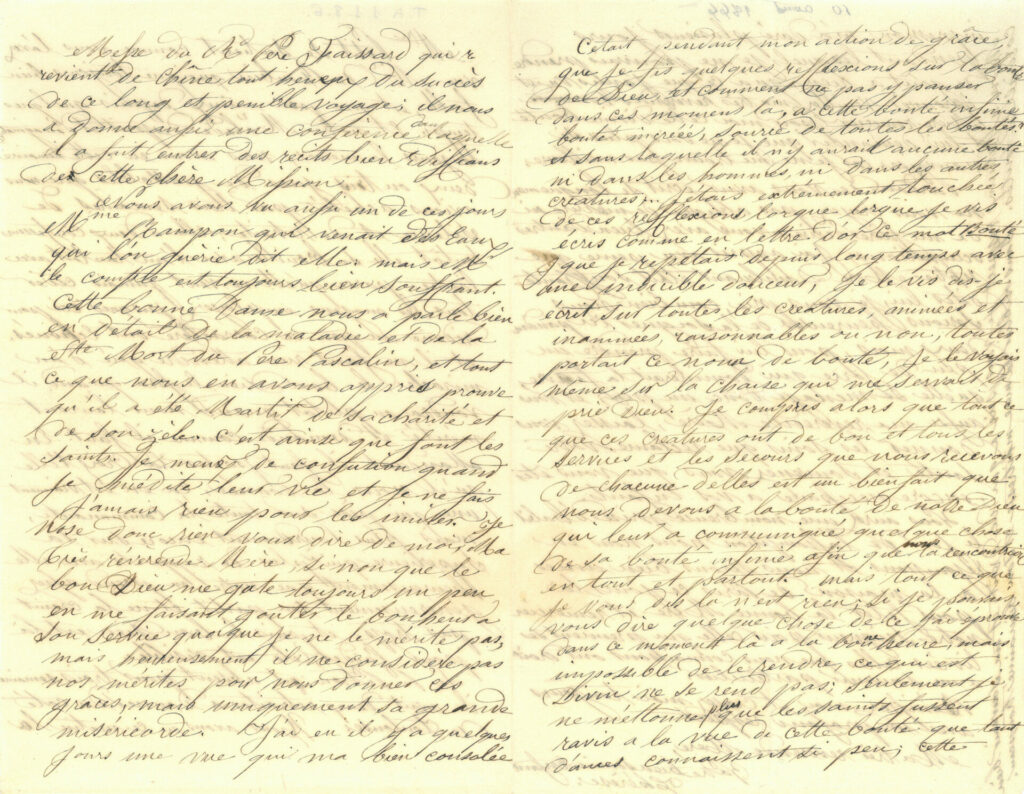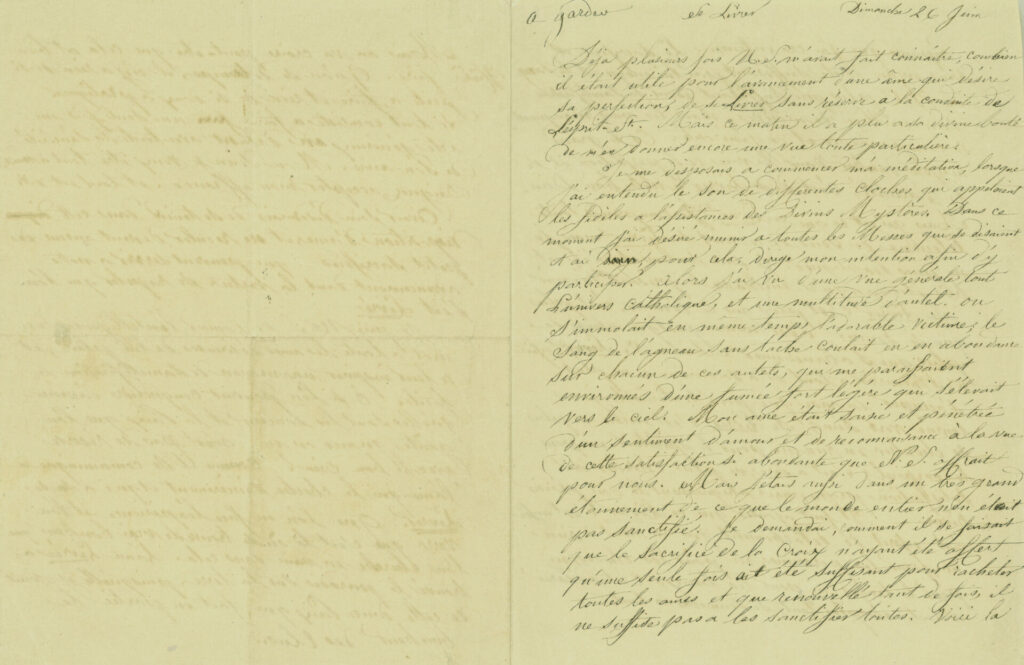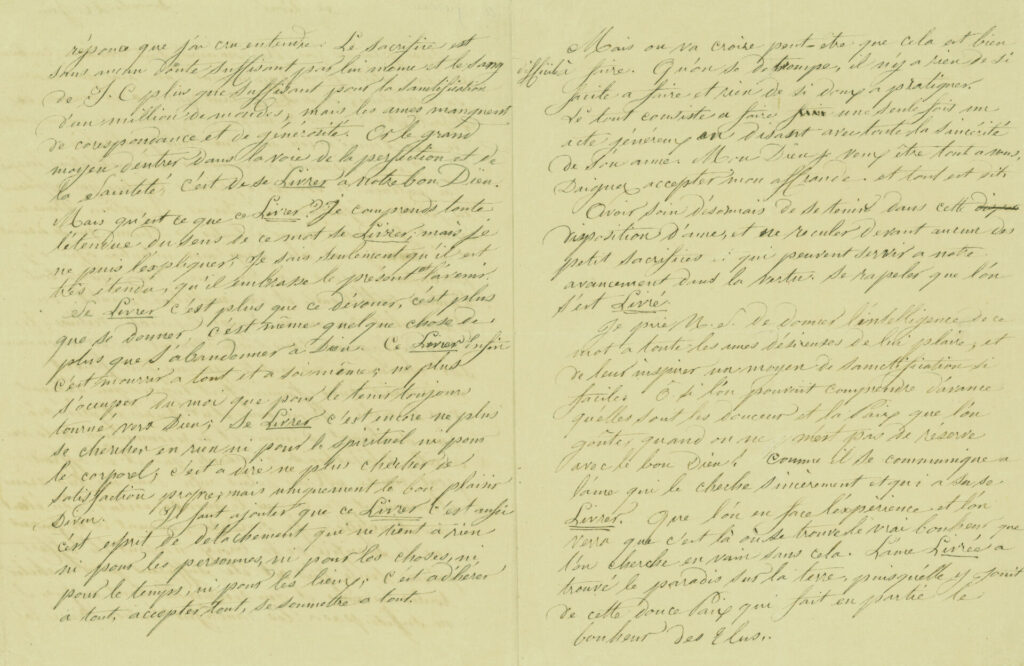Resources EN
F.A.Q.
We answer your questions
We are religious sisters, meaning that we have consecrated our lives to Christ through religious vows. Our life is entirely focused on our mission, which is to “make Jesus Christ known and loved,” as our founders put it.
Our life is resolutely apostolic, but with an important part devoted to prayer. A nourished spiritual life enables us to help others deepen their relationship with Christ. On the other hand, we integrate our apostolate into our daily prayer.
It is common for the name of a Catholic religious congregation to be abbreviated by a few letters. This abbreviation follows, for example, the religious name. At the Cenacle, we sign “RC” because we are Religious of the Cenacle.
There are no Brothers of the Cenacle. However, men who feel close to our spirituality and charism can join one of the lay groups that share our spirituality.
There is only one way to belong to the Congregation: by being religious and having taken religious vows in the Congregation. However, it is possible to share the spirituality and charism of the Congregation without being a religious. There are various groups of lay people who form the spiritual family of the Cenacle, including a group of consecrated lay women who also take vows.
On 1 August 2023, there were 300 Sisters in 12 countries on 5 continents.
We are present on all 5 continents. In Europe: France, Italy, England, Ireland. In America: United States, Brazil. In Oceania: New Zealand, Australia. In Asia: Philippines, Singapore.
We don’t have a uniform religious habit. We adapt to local situations. In some parts of the world, we wear the veil, in others we wear simple clothes. But we all wear the same cross, unique to the Congregation.
In their spiritual journey, seekers of God can follow in the footsteps of a saint, another seeker of God who has gone before them and is given as an example by the Church. It is a good idea to ask for the intercession of a saint and to imitate his or her spiritual journey.
A relic is a material support for faith, but there are other ways of making the saint present to us in prayer. As relics are rare and precious, we prefer to give an image or a prayer of Saint Thérèse Couderc as an aide in prayer.
You can approach a Cenacle community. We would be happy to share with you the treasures of the spirituality of our foundress, Saint Thérèse Couderc.
The Congregation finds its inspiration in the experience of Mary in the Cenacle, who, with the disciples gathered together after the death of Jesus, remembers Him, awaits and hopes for the descent of the Spirit, and gives herself over to His action. In this way, she helped the nascent Church to move from fear to boldness.
Our founders remembered Jesus in prayer and contemplation, and, moved by a great trust in God’s Goodness, allowed themselves to be shaped by the Spirit in the concrete aspects of their lives and in the founding events. Sainte Thérèse Couderc, our foundress, in a text that she wished to keep, shares what she understood about the spiritual movement of ‘Self-Surrender’.
From the beginning, the spirituality and pedagogy of the Spiritual Exercises (which place at their centre the free dialogue between God and his creature) have enabled us to live personally and in mission, trust in the Father, the memory of Jesus and docility to the work of the Spirit.
Today, we too, the Sisters of the Cenacle, wish to be a community which, at the heart of this world, lives and helps others to live a movement of rootedness in Christ and openness to Life.
Following in the footsteps of our foundress, Saint Thérèse Couderc, we see the goodness of God in every person, in creation and in everything. We seek to conform our lives to the will of the good God, who loves us and wants us to have life in abundance (Jn 10:10). We are attentive to inner movements and the reality of this world so that we can discern the Lord’s calls in our daily lives and give ourselves over to the guidance of the Spirit.
Yes, Mary has a special role in our Congregation. Our Constitutions express this well: “To live in the Cenacle is to live with Mary in the overshadowing of the Holy Spirit and to share in her giving of Christ to others. The privileged role of Mary in our Congregation stems from the deliberate acts of our founders who expressly gave the Congregation to Mary. This has shaped our history and marks our community and apostolic life.
It is Mary in the Cenacle who incarnates what we are called to be as sisters of the Cenacle. In contemplating her there, waiting and listening in the solitude of the heart, receiving and surrendering again to the Spirit, we come to understand the depth of our own vocation and its reflection of the example of Our Lady in the Cenacle.
We celebrate her with joy as Mother of Jesus, Mother of the Church and our mother.” (n°37).
Throughout our history, we have received a great deal from the Jesuits and we often collaborate with them. But we are different from the Jesuits. For example, we are not involved in schools.
On the other hand, we are Ignatian because our spirituality and our apostolate owe a great deal to the Spiritual Exercises of Saint Ignatius. The Spiritual Exercises are the basis of our formation and they are our privileged tool in the apostolate, but with a tone that is our own, as women, inspired by the spirituality inherited from our foundress (seeing the Goodness of God in all things and allowing ourselves to be led by the Spirit).
The spiritual family that lives the charism of the Cenacle is not made up of religious sisters alone. There are also consecrated women who, through their daily lives and while having a profession, commit themselves to the service of God and the Church according to the specific charism of the Cenacle. Gathering at times in small groups, they take vows of celibacy, poverty and obedience.
Lay men and women, married or single, also live the spirituality of the Cenacle, meeting periodically to share their lives.
They all place prayer and the Eucharist at the centre of their lives, receive formation, and can collaborate in the work of retreats and spiritual accompaniment.
We cooperate in the Church’s mission to proclaim the Gospel. Impelled by Christ’s love, our apostolic service is devoted to awakening and deepening the faith through retreats, catechesis, spiritual guidance, and other related spiritual ministries.
Impelled by our love for Christ and the world, we desire the Gospel to become a source of life for everyone. To this end, in our apostolate, we seek to reach out to everyone who is open to encounter, especially those who are looking for something more in their lives. In the last General Chapter, ‘we felt called to pay particular attention to women, young people, and people on the periphery of the Church and society, as well as those of no religion or of other religions.’
All this without ceasing to make Christ known and loved by Christians, and in particular by anyone wishing to be accompanied in the growth of their faith and in the discernment of God’s will for their lives. Individuals, children, priests, religious, groups, families, chaplaincies….
In our spiritual centres, it is possible to stay on site for an individual or group spiritual retreat lasting several days.
Making a retreat means stepping back from your daily life to listen to God, yourself and reality, with the aim of growing in communion with God and putting your life in order.
The Spiritual Exercises, born of the spiritual experience of Saint Ignatius of Loyola, offer ways of living this experience. During a retreat, people are invited to pray from Scripture, contemplate the life of Jesus, and allow themselves to be touched by it. The words, images and stories that are the subject of their prayer produce thoughts, feelings and reactions that resonate with their lives. Through personal accompaniment and an introduction to spiritual discernment, the retreatant is helped to understand the origin and meaning of what lives and moves in the depths of his or her heart. In this way, the retreatant can grow in freedom, find his/her bearings in the face of the calls heard from God and make personal choices.
For those who cannot spare several days, there are also proposals for living the Spiritual Exercises in ordinary life.
Contact the community nearest you. You’ll find the contact details on the map on our website.
Spiritual accompaniment is a long-term commitment with regular meetings. Regularity is important because it allows you to follow your spiritual growth. The frequency of meetings is discerned together. They could be once a month, for example. Each meeting should be prepared so that I arrive knowing what I’m going to say. They last an hour on average.
The person who accompanies is a person of prayer who has received specific training in accompaniment. Her first role is to listen sympathetically as you review your life and your relationship with God. She can then use questions and suggestions to help me recognise what’s going on inside me and identify God’s presence in my life. She can also suggest ways of praying. She is not there to dictate my path but to walk with me, listening to the Holy Spirit and respecting my freedom.
The aim of accompaniment is to help me grow both humanly and spiritually.
Spiritual guidance is based on a relationship of trust, in which the person being supported must feel free to speak and, therefore, at ease. If this is not the case, don’t hesitate to ask for a change of spiritual director. Each of our Sisters has particular gifts. You’re sure to find the Sister with whom you feel comfortable walking under God’s watchful eye. In some spiritual centres, we also have lay collaborators trained in accompaniment.
Everything related to the spiritual life is priceless. However, our apostolate is our daily activity, which leaves us no time for a regular paid job. In order to offer a quality service to the people who come to us, we take the time to train and acquire real skills. So, we need everyone’s financial support, large or small, to enable us to live and continue to form ourselves. Sometimes, certain donations help us to also offer our apostolate to those who have fewer means.
Yes. Our participation in the Church’s mission is also expressed in prayer. In particular, we entrust the intentions given to us to the intercession of Saint Thérèse Couderc. Some of our communities are particularly involved in this apostolate of prayer.
Contributing to our mission can take many different forms: you can pursue formation to work with us to lead programs or retreats, or to become a spiritual director; you can also give time to welcome people or groups who come to our spiritual centres, help with the accounts, and so much more… in fact, many talents are useful to our mission!
You can also help us by making a donation to help our communities survive and enable people who do not have the means to participate financially in our activities to benefit from our apostolate. Finally, you can support us through prayer.
Consecrated life is a gift from God to humanity that manifests itself in various ways (religious life, secular institutes, societies of apostolic life, consecrated virgins, new forms, etc.). In each of these forms, men and women deepen their baptismal consecration and profess the evangelical counsels, choosing to live them in a way similar to that of Jesus. The characteristic features of his identity and his love (chastity, poverty, obedience) thus acquire a particular visibility and constitute a fruitful witness to the Gospel.
Traditionally, men and women religious publicly profess the vows of chastity, poverty and obedience. They undertake to live the evangelical counsels, which are addressed to all Christians, in a particular way, close to that chosen by Jesus. Through chastity, they commit themselves to a life of celibacy in order to love Jesus Christ with an undivided heart and to be open to a free and universal love for all their brothers and sisters, especially the poorest and those who suffer. Poverty is lived in a relationship of trust in the loving care of God the Father, as freedom of heart from material possessions, sharing with the poorest and taking action against various forms of injustice. Obedience is lived out in authentic and trusting dialogue with those in authority, as loyal participation in discerning God’s will and readiness for mission – whether in daily life or at the moment of receiving a particular mission.
A vocation is a call from the Lord that can set us in motion and give direction to our whole lives. It seizes us and shapes us when, by welcoming God’s loving gaze on ourselves and the world and dialoguing with Him, we allow our deepest desire to emerge and resonate within us. A vocation is a source of freedom, fulfillment, and joy, and leads to the choice of a particular way of life to love and live the Gospel as followers of Christ in today’s world.
You discover your vocation in prayer and in your relationship with the Lord. That’s why it’s important to devote time to listening to the Word of God and trusting dialogue with Him, in which we welcome His gaze on us, on our own lives and on the world. It is also essential to observe when we truly feel ourselves, free, dynamic and ‘able’ to love. Reflecting on our prayer and these life situations with the help of a spiritual companion gives us precious indications for discerning our vocation.
To recognise the call to religious life, it is essential to listen to the movements of the heart and how they unfold over time. What does the prospect of consecrating myself to God through the vows of chastity, poverty and obedience, of living in community, of giving myself to others in one of the many ways in which Jesus approached his neighbour, arouse in me in prayer and in moments when I feel close to God?
If I feel challenged at the deepest level, if I feel a certain attraction, despite some resistance, if, over time, I feel the courage to face my fears, if I am filled with a peace and joy rooted in reality, I can take the means to deepen the path of discernment.
To discern one’s vocation, it is essential to have an authentic prayer life and not to journey alone. Spiritual guidance is very helpful in recognising and interpreting the movements of the heart and finding ways to move towards a decision. For example, at some point, it might be a good idea to go on a retreat according to the Spiritual Exercises of Saint Ignatius.
Sometimes it might also be helpful to have (and revisit) concrete experiences (such as an internship in a community), which, by bringing us into contact with a particular reality, offer valuable elements for discernment.
It can also be useful to turn to your diocese’s vocation ministry and check whether there are any proposals for journeying with other young people who are wondering about their vocation.
If you know a Cenacle sister, you can contact her. She will give you the information you need. If you don’t know any Cenacle sisters, you can contact the nearest community (see where we are on the map on this site).
There is no standard model for a Cenacle Sister. The richness of our Congregation lies in the diversity of our characters, gifts and life experiences.
Joining the Cenacle is the fruit of the convergence of the personal discernment of the woman and that of the Congregation, which recognises the signs of a call to this particular way of life. The depth of the desire to follow Christ and to give oneself totally to Him, an inner understanding of the spirit and mission of the Cenacle and an attraction to this charism are very important. It is also necessary to have the availability to receive the formation necessary for integration into the Congregation. You must also have the desire and human qualities required to live the mission in community in today’s world and in an international Congregation.
The discernment process for entering the Cenacle follows the methodology of Ignatian spirituality. The specific stages may vary depending on the person and the context.
The first phase aims to get to know one another. The woman who feels attracted to the Cenacle spends time in one or more communities, dialogues with the sisters, shares the prayer life and, as far as possible, participates in the apostolic mission. Reviewing these experiences and their inner impact helps to determine the next steps to be taken. When the time is right, the woman is put in direct contact with the provincial superior, to whom she can express her desire to join the Cenacle.
Formation in the Cenacle unfolds according to the traditional stages of religious life: the postulancy (6 months to 2 years), a period of deepening mutual knowledge; the novitiate (2 years), a real introduction to religious life and preparation for consecration through first vows; the period of temporary profession (5 to 9 years), a time of intellectual, apostolic and practical formation, which concludes with the tertianship year. During this time, all apostolic activities are suspended in order to devote oneself, with the accompaniment of a sister, to prayer and deepening the charism, with a view to final incorporation through perpetual profession. During this tertianship year, there is usually a 30-day retreat and an internship in a community in a country other than one’s own. After final commitment, the sister does not cease to form herself, but enters into a process of ongoing formation, necessary to remain deeply rooted in Christ and place herself at the service of the men and women of our time.
